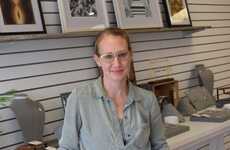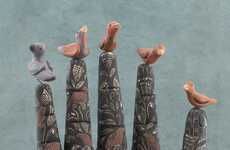
Socially Responsible Jewelry
Tiana Reid — March 30, 2012 — Social Good
References: penelopepoet
As the Founder and President of the socially conscious jewelry company Penelope Poet, Joanne Gouaux has a knack for beautiful things. But by combining her past business experience, she has also created a successful endeavor that thrives on giving back.
SocialBusiness.org got the opportunity to chat with Joanne Gouaux and learn more on how she started Penelope Poet, as well as her views on the intersection between business and social impact.
Four Questions with Joanne Gouaux
1. How did the idea for the business model come about?
Penelope Poet is an idea of something that I needed on a personal and professional level. The idea of creating a place where people can go to find meaningful pieces of shimmering loveliness to share with their inner circle has been with me from my earliest memories. Our sense of belonging and connection to those we love is instinctive and an essential part of how we feel about our quality of life. My nurturing instinct is a palpable part of my personality. That said, I spent the early part of my career learning the ins and outs of Internet retail, which isn't exactly a touchy-feely learning ground, and yet I garnered invaluable tools and experience. I worked for a small, extremely talented software firm with some big name clients during the early 2000's -- right after the dot-com bubble burst. Learning about small and mid-size business needs from the lens of service provider gave me an up-close and detailed look at which online commerce businesses were making a return on their investment, which plans were thriving, and which business models were waning and destined to fail. As the ideas continued to incubate over the years, I knew that entering into a "non-necessities" line of business would be risky and that in order for the business to survive, it would need to not only fulfill my financial expectations -- it would need to be socially nourishing and positive message oriented so as to sustain my passion through the inevitable ups and downs that all entrepreneurs face.
2. How did you decide to join this sector?
Prior to starting Penelope Poet, I worked for LeapFrog Enterprises, a publicly traded educational toy manufacturer here in the San Francisco Bay Area. One of the things that drew me to join the company was a story I had read about their work in the Wall Street Journal in August of 2004. The headline was something like, " A High-Tech Toy Does Double Duty With Afghan Women." At the time, the company's flagship product was the LeapPad. The product had reached huge success here in the US by helping kids learn to read. Long story short, The U.S. Department of Health and Human Services collaborated with LeapFrog to create a special version of the product designed to help with women's health care in Afghanistan. At the time, a huge portion of women in Afghanistan were illiterate and this new technology helped to bridge the gap and provide vital health and wellness information to struggling families in need of basic medical resources and information. This collaboration is inspiring. The concept that business and social issues are not mutually exclusive ventures resonates for me. A company can turn profit and address humanitarian deficits.
3. How do you get your inspiration?
I have an insatiable appetite for understanding the world around me. It's this curiosity that feeds my imagination and keeps daily life interesting. As a parent of two young children I'm given endless teachable moments and opportunities to practice patience and compassion. My relationship with my children constantly stretches me to be a better person. Every interaction I share with family, friends and community fuels my love of possibility.
4. How do you reset yourself to be creative? Do you have any rituals?
Yes, I do have rituals and people who help unwind and keep life in perspective. I go to a local dance class on Sunday mornings (more often if time permits), and I spend time playing piano with my son at least twice a week. I'm also a huge fan of NPR's "The American Life" and thanks to their podcast, I rarely miss a show. It's a great way to decompress.
SocialBusiness.org got the opportunity to chat with Joanne Gouaux and learn more on how she started Penelope Poet, as well as her views on the intersection between business and social impact.
Four Questions with Joanne Gouaux
1. How did the idea for the business model come about?
Penelope Poet is an idea of something that I needed on a personal and professional level. The idea of creating a place where people can go to find meaningful pieces of shimmering loveliness to share with their inner circle has been with me from my earliest memories. Our sense of belonging and connection to those we love is instinctive and an essential part of how we feel about our quality of life. My nurturing instinct is a palpable part of my personality. That said, I spent the early part of my career learning the ins and outs of Internet retail, which isn't exactly a touchy-feely learning ground, and yet I garnered invaluable tools and experience. I worked for a small, extremely talented software firm with some big name clients during the early 2000's -- right after the dot-com bubble burst. Learning about small and mid-size business needs from the lens of service provider gave me an up-close and detailed look at which online commerce businesses were making a return on their investment, which plans were thriving, and which business models were waning and destined to fail. As the ideas continued to incubate over the years, I knew that entering into a "non-necessities" line of business would be risky and that in order for the business to survive, it would need to not only fulfill my financial expectations -- it would need to be socially nourishing and positive message oriented so as to sustain my passion through the inevitable ups and downs that all entrepreneurs face.
2. How did you decide to join this sector?
Prior to starting Penelope Poet, I worked for LeapFrog Enterprises, a publicly traded educational toy manufacturer here in the San Francisco Bay Area. One of the things that drew me to join the company was a story I had read about their work in the Wall Street Journal in August of 2004. The headline was something like, " A High-Tech Toy Does Double Duty With Afghan Women." At the time, the company's flagship product was the LeapPad. The product had reached huge success here in the US by helping kids learn to read. Long story short, The U.S. Department of Health and Human Services collaborated with LeapFrog to create a special version of the product designed to help with women's health care in Afghanistan. At the time, a huge portion of women in Afghanistan were illiterate and this new technology helped to bridge the gap and provide vital health and wellness information to struggling families in need of basic medical resources and information. This collaboration is inspiring. The concept that business and social issues are not mutually exclusive ventures resonates for me. A company can turn profit and address humanitarian deficits.
3. How do you get your inspiration?
I have an insatiable appetite for understanding the world around me. It's this curiosity that feeds my imagination and keeps daily life interesting. As a parent of two young children I'm given endless teachable moments and opportunities to practice patience and compassion. My relationship with my children constantly stretches me to be a better person. Every interaction I share with family, friends and community fuels my love of possibility.
4. How do you reset yourself to be creative? Do you have any rituals?
Yes, I do have rituals and people who help unwind and keep life in perspective. I go to a local dance class on Sunday mornings (more often if time permits), and I spend time playing piano with my son at least twice a week. I'm also a huge fan of NPR's "The American Life" and thanks to their podcast, I rarely miss a show. It's a great way to decompress.
Trend Themes
1. Socially Responsible Jewelry - The trend of socially responsible jewelry presents an opportunity for businesses to create beautiful pieces that also give back to the community.
2. Business and Social Impact - The intersection between business and social impact offers the potential for companies to address humanitarian deficits while still being profitable.
3. Curiosity and Imagination - The trend of curiosity and imagination fuels creativity and innovation, providing opportunities for businesses to tap into new ideas and possibilities.
Industry Implications
1. Jewelry - The jewelry industry can explore the socially responsible jewelry trend to create pieces that align with consumers' values and contribute to positive change.
2. Education - The education industry can learn from LeapFrog Enterprises' collaboration with the U.S. Department of Health and Human Services to address social issues while delivering educational products.
3. Arts and Entertainment - The arts and entertainment industry can leverage creativity and imagination trends to develop captivating content and experiences that engage and inspire audiences.
2
Score
Popularity
Activity
Freshness























